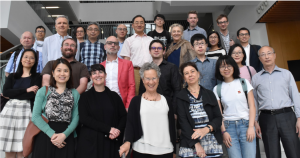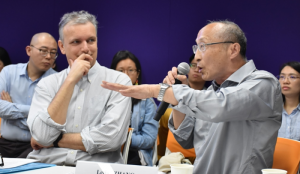2019 International Symposium on “Conjuring the Socialist Rural: Locality, Economy, and Imagination of Village Life in 1950s China”
 About the Symposium
About the Symposium
This interdisciplinary symposium brings together scholars who are engaged in exploring the formation of the rural in the early years of the PRC, beginning from the First Five Year Plan to the Great Leap Forward. We intend to investigate, through discussion and paper presentations, how agricultural production was re-organized under the new Socialist formation; how PRC policies could or could not be implemented and supplemented in different regions; how villagers responded to the new policies; and how, ultimately, the problem of value extraction from rural agricultural production for investment in urban industrial production became one of the biggest theoretical and social concerns of “socialist economics” of the time.

The symposium is organized around the investigation into the ideological operations of conjuring the socialist rural: people’s everyday lives, ethnographic accounts, artistic renditions (visual and literary), cultural representations, socio-economic imaginations, and more. The symposium sets its goals to understand how the agrarian emerged from the revolutionary years as a site of mobilization to a core logic of governance and imaginative problem for the newly modernizing socialist state. Returning to the 1950s is meaningful historically, but also crucial for gaining a better sense of contemporary China.
Co-organizers (in alphabetical order):
- Centre for China Studies, The Chinese University of Hong Kong
- Centre for Cultural Studies, Department of Cultural and Religious Studies, The Chinese University of Hong Kong
- Department of History, New York University
Date
16-18 May 2019
Venue
CYT 209A, Henry Cheng International Conference Centre, Cheng Yu Tung Building (CYT), The Chinese University of Hong Kong [Campus Map]
Languages
English and Mandarin
Presenters (in alphabetical order):
- Tani BARLOW (Department of History, Rice University)
- Harlan CHAMBERS (Department of East Asian Languages and Cultures, Columbia University)
- Brian DEMARE (Department of History, Tulane University)
- 董國強 DONG Guoqiang (Department of History, Fudan University)
- David FAURE (Department of History, The Chinese University of Hong Kong)
- 賀喜 HE Xi (Department of History, The Chinese University of Hong Kong)
- Gail HERSHATTER (Department of History, University of California, Santa Cruz)
- 金光耀 JIN Guanyao (Department of History, Fudan University)
- Rebecca KARL (Department of History, New York University) (Convenor)
- Jan KIELY (Centre for China Studies, The Chinese University of Hong Kong) (Convenor)
- Benjamin KINDLER (Department of East Asian Languages and Cultures, Columbia University)
- 劉詩古 LIU Shigu (Department of History, Xiamen University)
- 孟悅 MENG Yue (Department of East Asian Studies, University of Toronto)
- 彭麗君 PANG Laikwan (Department of Cultural and Religious Studies, The Chinese University of Hong Kong) (Convenor)
- Aminda SMITH (Department of History, Michigan State University)
- 辛逸 XIN Yi (School of Marxism Studies, Renmin University of China)
- 張樂天 ZHANG Letian (Department of Sociology, Fudan University)
- 張宇 ZHANG Yu (Department of Chinese Culture, The Hong Kong Polytechnic University)
Chairs (in alphabetical order):
- 郭燕平 GUO Yanping (School of Information Technology in Education, South China Normal University)
- Andrew KIPNIS (Department of Anthropology, The Chinese University of Hong Kong)
- Pierre LANDRY (Department of Government and Public Administration, The Chinese University of Hong Kong)
- 李思逸 LI Siyi (Department of Cultural and Religious Studies, The Chinese University of Hong Kong)
- 譚佳 TAN Jia (Department of Cultural and Religious Studies, The Chinese University of Hong Kong)
- Kristof VAN DEN TROOST (Centre for China Studies, The Chinese University of Hong Kong)
Round-table Discussants (in alphabetical order):
- Fabio LANZA (Department of History and Department of East Asian Studies, University of Arizona)
- 徐啟軒 Brian TSUI (Department of Chinese Culture, The Hong Kong Polytechnic University)
Paper Abstracts
The paper abstracts of the symposium are accessible via the below link or QR code.
https://drive.google.com/drive/folders/1-zvE0UVpf2ynwYG5XrXNLtPnhR77WcVp?usp=sharing
Poster
Please click here to access the symposium poster.
Programme
Please click here to view the symposium programme.
Acknowledgement of Support
This symposium is organized under the generous support of the Faculty of Arts, CUHK and Chiang Ching-kuo Foundation.


